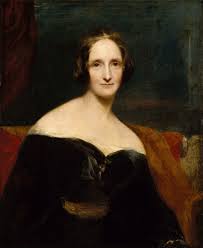Frankenstein Page #15
Frankenstein; or, The Modern Prometheus is an 1818 novel written by English author Mary Shelley. Frankenstein tells the story of Victor Frankenstein, a young scientist who creates a sapient creature in an unorthodox scientific experiment
“Little alteration, except the growth of our dear children, has taken place since you left us. The blue lake and snow-clad mountains—they never change; and I think our placid home and our contented hearts are regulated by the same immutable laws. My trifling occupations take up my time and amuse me, and I am rewarded for any exertions by seeing none but happy, kind faces around me. Since you left us, but one change has taken place in our little household. Do you remember on what occasion Justine Moritz entered our family? Probably you do not; I will relate her history, therefore in a few words. Madame Moritz, her mother, was a widow with four children, of whom Justine was the third. This girl had always been the favourite of her father, but through a strange perversity, her mother could not endure her, and after the death of M. Moritz, treated her very ill. My aunt observed this, and when Justine was twelve years of age, prevailed on her mother to allow her to live at our house. The republican institutions of our country have produced simpler and happier manners than those which prevail in the great monarchies that surround it. Hence there is less distinction between the several classes of its inhabitants; and the lower orders, being neither so poor nor so despised, their manners are more refined and moral. A servant in Geneva does not mean the same thing as a servant in France and England. Justine, thus received in our family, learned the duties of a servant, a condition which, in our fortunate country, does not include the idea of ignorance and a sacrifice of the dignity of a human being. “Justine, you may remember, was a great favourite of yours; and I recollect you once remarked that if you were in an ill humour, one glance from Justine could dissipate it, for the same reason that Ariosto gives concerning the beauty of Angelica—she looked so frank-hearted and happy. My aunt conceived a great attachment for her, by which she was induced to give her an education superior to that which she had at first intended. This benefit was fully repaid; Justine was the most grateful little creature in the world: I do not mean that she made any professions I never heard one pass her lips, but you could see by her eyes that she almost adored her protectress. Although her disposition was gay and in many respects inconsiderate, yet she paid the greatest attention to every gesture of my aunt. She thought her the model of all excellence and endeavoured to imitate her phraseology and manners, so that even now she often reminds me of her. “When my dearest aunt died every one was too much occupied in their own grief to notice poor Justine, who had attended her during her illness with the most anxious affection. Poor Justine was very ill; but other trials were reserved for her. “One by one, her brothers and sister died; and her mother, with the exception of her neglected daughter, was left childless. The conscience of the woman was troubled; she began to think that the deaths of her favourites was a judgement from heaven to chastise her partiality. She was a Roman Catholic; and I believe her confessor confirmed the idea which she had conceived. Accordingly, a few months after your departure for Ingolstadt, Justine was called home by her repentant mother. Poor girl! She wept when she quitted our house; she was much altered since the death of my aunt; grief had given softness and a winning mildness to her manners, which had before been remarkable for vivacity. Nor was her residence at her mother’s house of a nature to restore her gaiety. The poor woman was very vacillating in her repentance. She sometimes begged Justine to forgive her unkindness, but much oftener accused her of having caused the deaths of her brothers and sister. Perpetual fretting at length threw Madame Moritz into a decline, which at first increased her irritability, but she is now at peace for ever. She died on the first approach of cold weather, at the beginning of this last winter. Justine has just returned to us; and I assure you I love her tenderly. She is very clever and gentle, and extremely pretty; as I mentioned before, her mien and her expression continually remind me of my dear aunt. “I must say also a few words to you, my dear cousin, of little darling William. I wish you could see him; he is very tall of his age, with sweet laughing blue eyes, dark eyelashes, and curling hair. When he smiles, two little dimples appear on each cheek, which are rosy with health. He has already had one or two little wives, but Louisa Biron is his favourite, a pretty little girl of five years of age. “Now, dear Victor, I dare say you wish to be indulged in a little gossip concerning the good people of Geneva. The pretty Miss Mansfield has already received the congratulatory visits on her approaching marriage with a young Englishman, John Melbourne, Esq. Her ugly sister, Manon, married M. Duvillard, the rich banker, last autumn. Your favourite schoolfellow, Louis Manoir, has suffered several misfortunes since the departure of Clerval from Geneva. But he has already recovered his spirits, and is reported to be on the point of marrying a lively pretty Frenchwoman, Madame Tavernier. She is a widow, and much older than Manoir; but she is very much admired, and a favourite with everybody. “I have written myself into better spirits, dear cousin; but my anxiety returns upon me as I conclude. Write, dearest Victor,—one line—one word will be a blessing to us. Ten thousand thanks to Henry for his kindness, his affection, and his many letters; we are sincerely grateful. Adieu! my cousin; take care of yourself; and, I entreat you, write! “Elizabeth Lavenza. “Geneva, March 18th, 17—.” “Dear, dear Elizabeth!” I exclaimed, when I had read her letter: “I will write instantly and relieve them from the anxiety they must feel.” I wrote, and this exertion greatly fatigued me; but my convalescence had commenced, and proceeded regularly. In another fortnight I was able to leave my chamber. One of my first duties on my recovery was to introduce Clerval to the several professors of the university. In doing this, I underwent a kind of rough usage, ill befitting the wounds that my mind had sustained. Ever since the fatal night, the end of my labours, and the beginning of my misfortunes, I had conceived a violent antipathy even to the name of natural philosophy. When I was otherwise quite restored to health, the sight of a chemical instrument would renew all the agony of my nervous symptoms. Henry saw this, and had removed all my apparatus from my view. He had also changed my apartment; for he perceived that I had acquired a dislike for the room which had previously been my laboratory. But these cares of Clerval were made of no avail when I visited the professors. M. Waldman inflicted torture when he praised, with kindness and warmth, the astonishing progress I had made in the sciences. He soon perceived that I disliked the subject; but not guessing the real cause, he attributed my feelings to modesty, and changed the subject from my improvement, to the science itself, with a desire, as I evidently saw, of drawing me out. What could I do? He meant to please, and he tormented me. I felt as if he had placed carefully, one by one, in my view those instruments which were to be afterwards used in putting me to a slow and cruel death. I writhed under his words, yet dared not exhibit the pain I felt. Clerval, whose eyes and feelings were always quick in discerning the sensations of others, declined the subject, alleging, in excuse, his total ignorance; and the conversation took a more general turn. I thanked my friend from my heart, but I did not speak. I saw plainly that he was surprised, but he never attempted to draw my secret from me; and although I loved him with a mixture of affection and reverence that knew no bounds, yet I could never persuade myself to confide in him that event which was so often present to my recollection, but which I feared the detail to another would only impress more deeply.
Translation
Translate and read this book in other languages:
Select another language:
- - Select -
- 简体中文 (Chinese - Simplified)
- 繁體中文 (Chinese - Traditional)
- Español (Spanish)
- Esperanto (Esperanto)
- 日本語 (Japanese)
- Português (Portuguese)
- Deutsch (German)
- العربية (Arabic)
- Français (French)
- Русский (Russian)
- ಕನ್ನಡ (Kannada)
- 한국어 (Korean)
- עברית (Hebrew)
- Gaeilge (Irish)
- Українська (Ukrainian)
- اردو (Urdu)
- Magyar (Hungarian)
- मानक हिन्दी (Hindi)
- Indonesia (Indonesian)
- Italiano (Italian)
- தமிழ் (Tamil)
- Türkçe (Turkish)
- తెలుగు (Telugu)
- ภาษาไทย (Thai)
- Tiếng Việt (Vietnamese)
- Čeština (Czech)
- Polski (Polish)
- Bahasa Indonesia (Indonesian)
- Românește (Romanian)
- Nederlands (Dutch)
- Ελληνικά (Greek)
- Latinum (Latin)
- Svenska (Swedish)
- Dansk (Danish)
- Suomi (Finnish)
- فارسی (Persian)
- ייִדיש (Yiddish)
- հայերեն (Armenian)
- Norsk (Norwegian)
- English (English)
Citation
Use the citation below to add this book to your bibliography:
Style:MLAChicagoAPA
"Frankenstein Books." Literature.com. STANDS4 LLC, 2025. Web. 22 Jan. 2025. <https://www.literature.com/book/frankenstein_1446>.




Discuss this Frankenstein book with the community:
Report Comment
We're doing our best to make sure our content is useful, accurate and safe.
If by any chance you spot an inappropriate comment while navigating through our website please use this form to let us know, and we'll take care of it shortly.
Attachment
You need to be logged in to favorite.
Log In